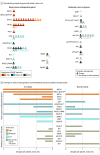Clinical Utility of Universal Germline Genetic Testing for Patients With Breast Cancer
- PMID: 36136330
- PMCID: PMC9500554
- DOI: 10.1001/jamanetworkopen.2022.32787
Clinical Utility of Universal Germline Genetic Testing for Patients With Breast Cancer
Abstract
Importance: National Comprehensive Cancer Network guidelines currently recommend germline testing for high-risk genes in selected patients with breast cancer. The clinical utility of recommending testing all patients with breast cancer with multigene panels is currently under consideration.
Objective: To examine the implications of universal testing of patients with breast cancer with respect to clinical decision-making.
Design, setting, and participants: Patients from a previously reported cohort were assessed as in-criteria or out-of-criteria according to the 2017 guidelines and underwent testing with a multigene germline panel between 2017 to 2018. Patients were women and men aged 18 to 90 years, with a new and/or previous diagnosis of breast cancer who had not undergone either single or multigene testing. Clinicians from 20 community and academic sites documented patient clinical information and changes to clinical recommendations made according to test findings. Association between prevalence of pathogenic or likely pathogenic germline variants and previously unreported clinical features, including scores generated by the BRCAPRO statistical model, was determined. Data were analyzed from April 2020 to May 2022.
Exposure: New and/or previous diagnosis of breast cancer.
Main outcomes and measures: Disease management recommendations that were changed as a result of genetic testing results are reported.
Results: Clinicians were asked to assess changes to clinical management as a result of germline genetic testing for 952 patients. Informative clinician-reported recommendations were provided for 939 (467 in-criteria and 472 out-of-criteria) of the patients with breast cancer (936 [99.7%] female; 702 [74.8%] White; mean [SD] age at initial diagnosis, 57.6 [11.5] years). One or more changes were reported for 31 of 37 (83.8%) in-criteria patients and 23 of 34 (67.6%) out-of-criteria patients with a pathogenic or likely pathogenic variant. Recommendations were changed as a result of testing results for 14 of 22 (63.6%) out-of-criteria patients who had a variant in a breast cancer predisposition gene. Clinicians considered testing beneficial for two-thirds of patients with pathogenic or likely pathogenic variants and for one-third of patients with either negative results or variants of uncertain significance. There was no difference in variant rate between patients meeting the BRCAPRO threshold (≥10%) and those who did not (P = .86, Fisher exact test). No changes to clinical recommendations were made for most patients with negative results (345 of 349 patients [98.9%]) or variants of uncertain significance (492 of 509 patients [96.7%]).
Conclusions and relevance: In this cohort study, germline genetic testing was used by clinicians to direct treatment for most out-of-criteria patients with breast cancer with pathogenic or likely pathogenic germline variants, including those with moderate-risk variants. Universal germline testing informs clinical decision-making and provides access to targeted treatments and clinical trials for all patients with breast cancer.
Conflict of interest statement
Figures


References
Publication types
MeSH terms
LinkOut - more resources
Full Text Sources
Medical
Miscellaneous

